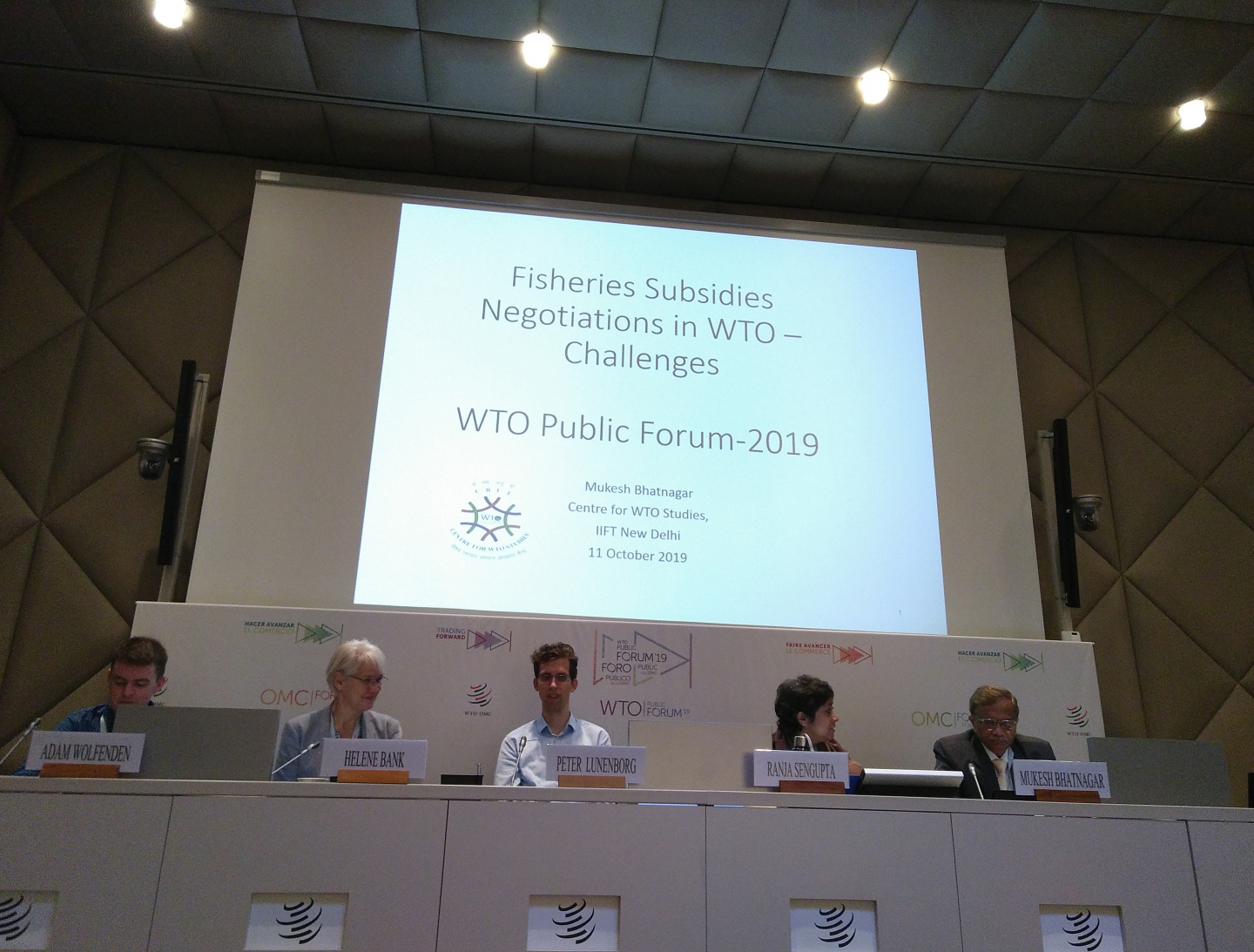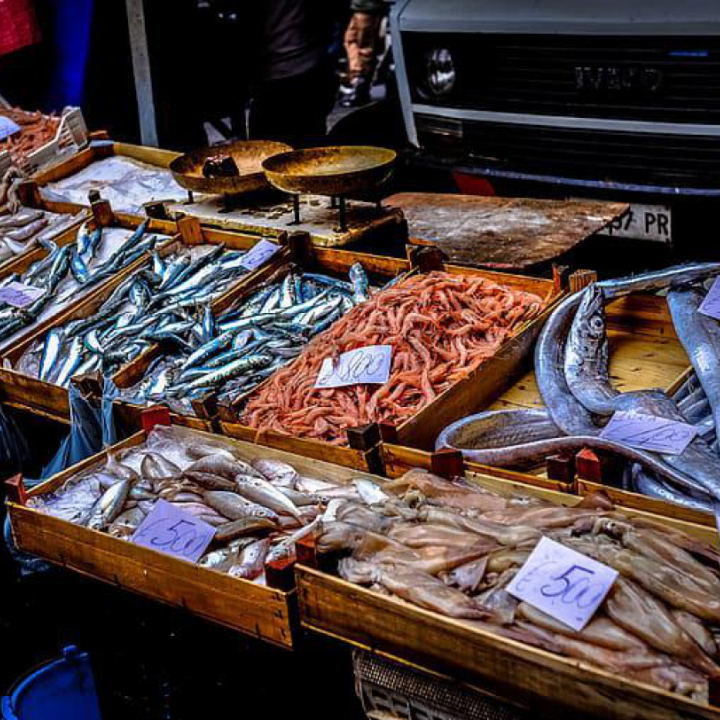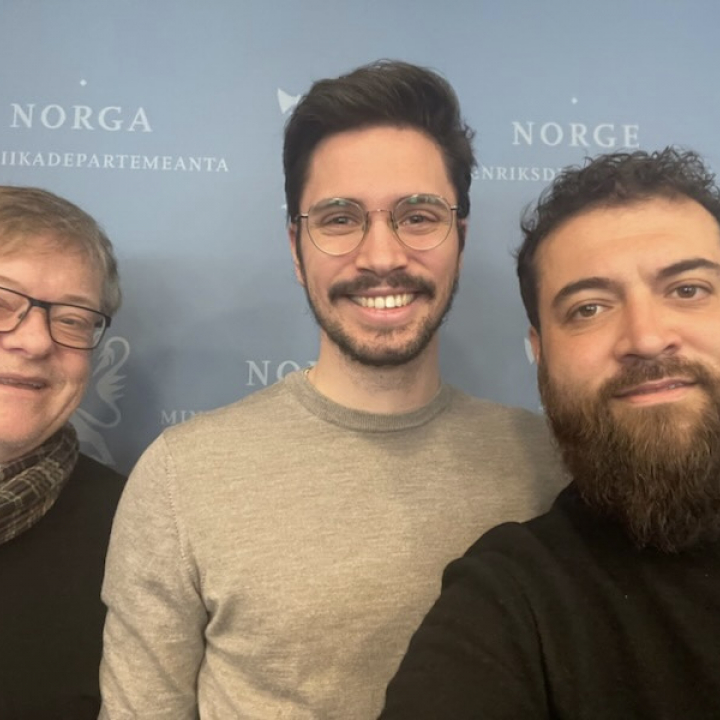Sustainable Development Goal (SDG) 14.6 has given a clear mandate to the World Trade Organization (WTO) to discipline certain fisheries subsidies while respecting the mandate of special and differential treatment so that the interests of small fishers in developing and least developed countries are protected. At this year's WTO Public Forum the panel organized by the Pacific Network on Globalisation (PANG) and Handelskampanjen (The Norwegian Trade Campaign) discussed the implications of these negotiations for development and sustainability and the need to ensure that one isn't sacrificed for the other.
SDG 14.6 aims to “by 2020, prohibit certain forms of fisheries subsidies which contribute to overcapacity and overfishing, and eliminate subsidies that contribute to Illegal, Unreported and Unregulated (IUU) fishing, and refrain from introducing new such subsidies, recognizing that appropriate and effective special and differential treatment for developing and least developed countries should be an integral part of the WTO fisheries subsidies negotiation”.
Professor Mukesh Bhatnagar from the Centre for WTO Studies highlighted the many issues currently facing the negotiations, including where there is some progress with draft vertical texts (Illegal, Unreported and Unregulated fishing and Overfished stocks) and where there seems to be no convergence on various approaches to discipline subsidies that contribute to Overfishing and Overcapacity.
On IUU fishing, he discussed the ongoing negotiations including how IUU can be determined and by whom. He pointed out the current central role of national authorities as well as Regional Fisheries Management Organisation (RFMOs) and Regional Fisheries Management Agreements (RFMAs). Once determinations were made the focus was on the proportionality and duration of any disciplines applied to specific vessels, including subsidies.
Regarding Overfished Stocks he spoke of the general consensus on using the best scientific evidence available to national authorities or the relevant RFMOs while making determinations whether stocks are overfished. There is broader convergence to the approach that if the subsidies cause negative effects to stocks declared as overfished, then only the obligation to prohibit subsidies should apply.
On Overfishing and Overcapacity, Professor Bhatnagar argued that convergence is still elusive as different approaches are being pursued based on a number of existing proposals, inter-alia, list approach or a mix of list and effects approach, general prohibition of subsidies for vessels fishing in areas beyond national jurisdiction. He also explained that they would demand choices between prohibitions on subsidies contributing to overfishing and overcapacity or use a capping of subsidies approach.
He highlighted the different types of subsidies being provided by developing and developed countries. While developing countries provide subsidies for fuel, motorization of traditional crafts, vessel construction, refrigeration, safety gear, infrastructure support, management measures, developed countries have shifted from direct capacity enhancing or direct payments or cost reducing payments to general services such as infrastructure, R&D, fisheries management measures. This raises a number of questions about how to determine which subsidies to discipline.
Professor Bhatnagar continued by explaining the deficiency of data about fisheries subsidies that currently exists. Comparing notifications to the WTO with OECD fisheries support estimates exposes that many WTO-members notify considerably less than OECD figures. The question was raised about how to discipline subsidies if they are considered non-specific in the WTO-particularly the non-specific fuel subsidies.
Regarding Special and Differential Treatment (SDT), Prof. Bhatnagar stated there are close to 50 million fish-workers globally who are generally in developing countries and rely on fishing for food security and livelihood. He discussed the SDT proposal from India as regards IUU disciplines, based on exemptions from WTO-disciplines within territorial waters, and argued for a transition period for Unregulated and Unreported fishing. The ACP has a somewhat similar position seeking transition period in respect of Unreported and Unregulated fishing for vessels – other than distant water large-scale vessels.
On the Overfishing and Overcapacity disciplines and SDT, Professor Bhatnagar outlined how India's proposal is based on exclusion for territorial and EEZ waters (as defined in the UN Convention on the Law of the Sea) with High seas fishing SDT subject to conservation and management measures. He also highlighted the ACP's proposal for SDT for developing countries and LDCs other than for large scale fishing vessels.
Professor Bhatnagar outlined the challenges that exist for SDT, namely to ensure that it is appropriate and effective. There is ongoing discussions however as there is no common agreement on a definition for small-scale, whether geographical location should be used, or whether vessel length should be a determining factor.
Peter Lunenborg, Senior Programme Officer from the South Centre, focussed his presentation on the issue of large-scale fishing. He stated that large-scale fishing fleets catch the most fish with the SeaAroundUs database estimating that such fisheries account for 75.1% of total fish catches. This takes into account modelled estimates of catches by small scale fisheries which are not always fully reported to the FAO. Large scale fishing also receives the most subsidies as documented in research by WWF and Sumaila, for instance Sumaila estimates that 84 per cent of total fisheries subsidies go to large-scale fisheries. The disparity between the small-scale and large-scale is even worse when one looks at fuel subsidies, over 90 percent of which is estimated to be given to large-scale fisheries through marine diesel subsidies. These fuel subsidies promote fuel-inefficient technology and help large-scale fishers stay in business, even when operating costs exceed total revenue gained from fishing. Furthermore, large scale fishing, compared with other fisheries sectors has lower socio-economic impact, and is also environmentally less sustainable, in terms of CO2 emissions, fuel consumption, discards, by-catch, and destruction of marine habitats.
Mr Lunenborg observed that all WTO Members recognize that there is a large difference between small scale and large scale fisheries and that differential treatment is justified. This has also been anchored in the FAO since 2015 with the promulgation of the Small Scale Fisheries (SSF) Guidelines, and more recent FAO Guidelines also incorporate the concept of SSF. The differentiation between small and large scale is de facto being applied by many countries in fisheries management. For instance in the case of South Africa, small scale fisheries have different fishing seasons compared to large scale fisheries, and in Myanmar only small scale fisheries (including ‘baby’ trawlers up to 125 hp) can fish in the area close to the shore.
Mr Peter Lunenborg noted that within the International Maritime Organization (IMO) some rules apply to all vessels but most rules only apply after certain thresholds are met. Eg NOx emission rules apply to vessels with large engines, i.e. those with engine power of 130kW or more. Some IMO conventions only apply for vessels beyond 100 or 300 GT etc. For instance, the Cape Town Agreement of 2012 on the Implementation of the Provisions of the 1993 Protocol relating to the Torremolinos International Convention for the Safety of Fishing Vessels, 1977 applies to fishing vessels > 24 meter or GT > 300. Since IMO is the competent organization in the maritime area and marine fishing is a maritime business, it would make sense to have a similar approach in the WTO fisheries subsidies disciplines.
Mr Peter Lunenborg spoke to the current proposals by the Africa, Caribbean and African (ACP) Group and Morocco which seek to discipline large-scale fishing and the criteria used. He suggested the focus should not be to arrive at a perfect definition of 'large scale' but to arrive at a 'minimum standard' for large scale, i.e. what could be reasonably considered large scale in every WTO Member. At a speech during this WTO Public Forum, DG Azevedo alluded to large scale fishing and the expertise of the WTO as well. Mr Lunenborg raised the role of active fishing gear on boats as a key trait that should be considered during determining disciplines given they may be the most important factor, not just vessel size.
He said that the large scale approach is preferred by many developing countries which has also been highlighted as 'Approach 2' by the Facilitator on Overcapacity and Overfishing (RD/TN/RL/98/Rev.2). Morocco proposed a characterisation of large scale fisheries (RD/TN/RL/103). The proposal by Morocco would cover around 40-50% of global fishing capacity depending on whether measured in engine power or gross tonnage, essentially disciplining those vessels globally that have the largest capacity to extract fish.
Mr Lunenborg concluded by cautioning against the use of a cap-based approach on overfishing and overcapacity as this can benefit existing large subsidisers, lock in existing inequalities and would be hard to monitor a violation of such discipline. For instance, 2 out of 6 notified fisheries subsidies provided by the US federal government do not have a reported monetary amount. Furthermore most fisheries subsidies are provided at the state level but none of these subsidies have a reported monetary amount (See Annex 1 of the ASCM notification, G/SCM/N/343/USA), something that is required under existing rules.
Initial research by the South Centre reveals that US federal and state subsidies for fuel alone amount to around USD 200 million annually. This amount is based on a number of assumptions such as fuel consumption by fishing vessels and retail price of fuel. This highlight the difficulty in assessing compliance with a discipline based on the capping approach.
Helene Bank, Chairperson of the Norwegian Trade Campaign, and Special Adviser to Campaign for The Welfare State, spoke about the need to address the questions: which stocks are overfished, which vessels are harvesting those stocks, and who is subsidizing those vessels? She also raised the concerns about the WTO's ability to deal effectively with the aims of the SDG given its track record and focus on competition and not developmental and environmental tasks – which the UN SDG 14.6 require.
She cautioned if the WTO is going beyond the mandate given to address certain subsidies on Overfishing and Overcapacity and IUU only. She supported Mr Lunenborgs approach to big vessels and active fishing gear. She argued for the need to discipline foreign high seas fleets fishing depleted stocks. She also underscored that SDG 14.6. included developed countries coastal fishers and coastal societies as well. Therefore, she argued, within domestic waters and EEZ small vessels, passive fishing gear and coastal fishing in general should be protected under the WTO disciplines.
She underscored that there is a need to acknowledge that there are positive subsidies that support better management of stocks and livelihoods of those communities that rely on fishing.
Adam Wolfenden from the Pacific Network on Globalisation detailed the history of trade negotiations being used to try secure resource access to fisheries in the Pacific Island Countries. Furthermore he demonstrated how some proponents of an ambitious outcome in the WTO negotiations have worked to undermine the successful management measures of fisheries in the Pacific Islands
He discussed new research released by PANG that, using a Fisheries Subsidies Index, highlights the statistical lack of socio-economic importance of fisheries production for 10 'Friends of Fish' countries following a negative correlation between fisheries sector employment and increases in fisheries sector production, Human Development Index, and GDP per capita. This provides the rationale as to why proposals by those members aim to facilitate market access, bring in management measures, and undermine developing countries support for the establishment of fishing industries.
Regarding the negotiations Mr Wolfenden highlighted the need to ensure that the sovereign rights of Members already enshrined under the United Nations Convention on the Law of the Seas, should not be eroded by outcomes on fisheries subsidies negotiations in the WTO. This includes ensuring that national determinations are acknowledged for both IUU as well as overfished stocks.
Mr Wolfenden also expressed concerns regarding the proposals on Overfishing and Overcapacity that were cap-based as it will provide a disincentive to increase production in many developing countries, will benefit those members with existing capacity, and undermines SDT.
Mr Wolfenden added that SDT must not be seen as a problem in these negotiations, it is a part of the task given by the UN SDG 14.6. It is not fair to blame developing countries for demanding what is established in the mandate of both the WTO and the SDG. He concluded by highlighting the failure to deliver on SDT is a failure to deliver on the SDG.
Participants in the panel:
- Professor Mukesh Bhatnagar from the Centre for WTO Studies
- Peter Lunenborg, Senior Programme Officer from the South Centre,
- Helene Bank, Chairperson of the Norwegian Trade Campaign,
- Adam Wolfenden from the Pacific Network on Globalisation
Summary written by Adam Wolfenden, PANG, from meeting at Public Forum 2019 with Handelskampanjen







